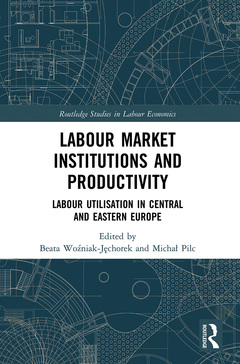Description
Labour Market Institutions and Productivity
Labour Utilisation in Central and Eastern Europe
Routledge Studies in Labour Economics Series
Coordinators: Woźniak-Jęchorek Beata, Pilc Michał
Language: English
Subjects for Labour Market Institutions and Productivity:
Keywords
Cee Country; Labour Utilisation; formal labour market institutions; Labour Market Institutions; Employment Protection Legislation; EU-15 Countries; central european economy; Active Labour Market Policy Measures; eastern european economy; Active Labour Market Policy; labour market outcomes; OECD Database; labour economics; ISCO Classification; CEE countries; Post-socialist Countries; transition reforms; Increase Labour Utilisation; centrally planned economies; Cee State; regional economics; Cee Region; macroeconomics; Occupational Matrix; Labour productivity; Minimum Wage Increase; Education Job Match; Labour market regulation; Unemployment Benefits Scheme; Central and Eastern Europe countries; Civil Law Contracts; Statutory Retirement Age; Recent Returnees; EPL Index; Minimum Wage Workers; Training Incidence; Data Set; Unemployment Benefit Duration
Publication date: 04-2022
Support: Print on demand
Publication date: 10-2020
· 15.6x23.4 cm · Hardback
Description
/li>Contents
/li>Readership
/li>Biography
/li>
This book explains the role of formal labour market institutions in keeping the labour utilisation in Central and Eastern Europe above the level characteristic for Western European states. It provides an innovative and enriching take on labour utilisation at large and how various formal labour market institutions can affect the ongoing trend in labour utilisation in a way that is not covered by the extant literature. The impact of labour market institutions on labour market outcomes is analysed throughout 12 chapters, both from a cross-country perspective and in detailed case-studies, by 21 labour market experts from various CEE countries.
Most chapters are based on empirical methods yet are presented in an easy-to-follow way in order to make the book also accessible for a non-scientific audience.
The volume explores three key questions:
- How can labour utilisation be increased by labour market institutions?
- Which CEE countries managed to create a labour market institutional framework beneficial for labour utilisation?
- How should the labour market institutions in CEE countries be reformed in order to increase labour utilisation?
The book argues that the legacy of transition reforms and a centrally planned past is still relevant in explaining common patterns among CEE countries and concludes that increasing the stock of skills accumulated by the employed and improving utilisation of these skills seems to be the first-best solution to increase labour utilisation.
The book will be of interest to post-graduate researchers and academics in the fields of labour economics, regional economics, and macroeconomics as well as scholars interested in adopting an institutional analysis approach. Additionally, due to the broader policy implications of the topic, the book will appeal to policymakers and experts interested in labour economics.
Introduction PART I 1. Labour Market Regulation and Labour Utilisation in CEE Countries 2. Institutional Determinants of Firm-Sponsored Training of Young Employees 3. Skills Utilisation – Analysis across Countries and Occupations. Western European and Post-Socialist Countries Comparison. 4. Unemployment Benefits in CEE Countries. Does Their Limited Scope Match Societal Preferences? 5. Part-Time Employment in Central and Eastern Europe: A Cross-Country Analysis PART II 6. Structures, Institutions and Agency: the Drivers of the Expansion of Precarious Employment in Poland 7. Skills Utilisation and Gender: Estonian Case Study 8. Utilisation of Returning Migrants’ Skills and Labour: The Case of Lithuania 9. The Economic Effects of the Minimum Wage in Slovenia 10. The Role of Old-age Pension Systems as Labour Market Institutions: the Czech Republic and Poland Compared 11. How Active Labour Market Policy Helps the Most Disadvantaged: Evidence from the Czech Republic 12. Eroding Collective Bargaining in CEE Countries as a Counterproductive Factor in the Process of Labour Utilisation: The Cases of Bulgaria and Poland Conclusions
Beata Woźniak-Jęchorek is an associate professor at the Institute of Economics at Poznań University of Economics and Business in Poland.
Michał Pilc is an assistant professor at the Institute of Economics at Poznań University of Economics and Business in Poland.




